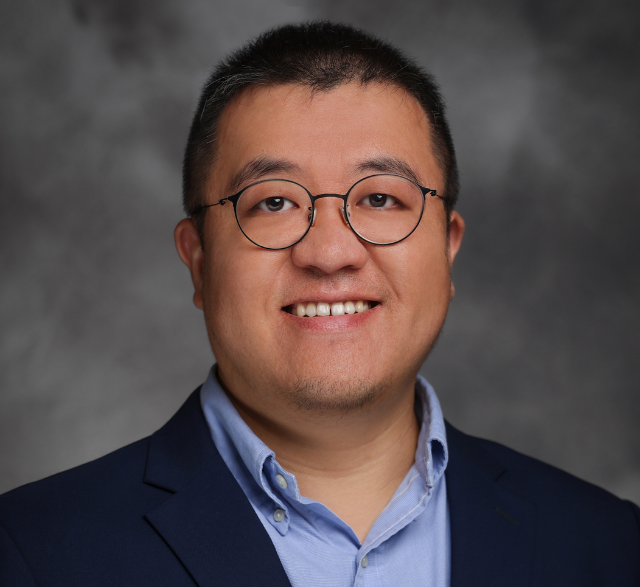
Yarui Diao, Ph.D. (The Hong Kong University of Science and Technology, Hong Kong, China)
Associate Professor of Cell Biology
E-mail: yarui.diao@duke.edu
DUMC Box 3709
406 Sands Building,
303 Research Drive,
Duke University Medical Center
Durham, NC 27710
Telephone: 684-8553
Fax 919-684-8090
Diao lab website
Regeneration Genomics
My research program, ‘Regeneration Genomics’, focuses on unraveling gene regulatory mechanisms driving cell fate changes during embryonic development and tissue regeneration, and understanding how these processes are disrupted in human diseases. In our quest to decode the fundamental mechanisms of gene regulation, we have also developed several cutting-edge genomic profiling and engineering tools, including CREST-seq, HiCAR, CARGO-BioID, and single cell HiCAR, that benefit both our research and the broader scientific community.
My passion for this research was sparked during my graduate work, where I explored the molecular mechanisms underlying skeletal muscle differentiation and regeneration using mice as model organisms. This experience highlighted the crucial role of non-coding gene regulatory elements (CREs), such as enhancers and promoters, in controlling gene expression across various biological processes and diseases. To deepen my research expertise in gene regulation and genomic technology, I joined Dr. Bing Ren’s lab at UC San Diego, where I utilized human embryonic stem cells (hESCs) as a model system and acquired the skills to generate powerful ‘omics scale tools for my independent research and for the broader research community. In September 2018, I established my independent lab at Duke, continuing to investigate gene regulation in development and regeneration. We use two model systems: hESCs differentiation during early developmental stage and mouse and human muscle stem cells (MuSCs) and their ‘niche’ population for research in the subdisciplines of skeletal muscle development, regeneration, and disease, including aging, muscular dystrophy, and chronic limb-threatening ischemia (CLTI).
Selected publications: (* co-first author and # co-corresponding author)
Southerland KW, Xu Y, Peters DT, Lin X, Wei X, Xiang Y, Fei K, Olivere LA, Morowitz JM, Otto J, Dai Q, Kontos CD, Diao Y. Skeletal muscle regeneration failure in ischemic-damaged limbs is associated with pro-inflammatory macrophages and premature differentiation of satellite cells. Genome Med. 2023 Nov 10;15(1):95. PMCID: PMC10636829
Wei X, Tran D, Diao Y. HiCAR: Analysis of Open Chromatin Associated Long-range Chromatin Interaction Using Low-Input Materials. Curr Protoc. 2023 Oct;3(10):e899. PMCID: PMC10575683
Okafor AE, Lin X, Situ C, Wei X, Xiang Y, Wei X, Wu Z, Diao Y. Single-cell chromatin accessibility profiling reveals a self-renewing muscle satellite cell state. J Cell Biol. 2023 Aug 7;222(8). PMCID: PMC10309185
Sun T, Xu Y, Xiang Y, Ou J, Soderblom EJ, Diao Y. Crosstalk between RNA m6A and DNA methylation regulates transposable element chromatin activation and cell fate in human pluripotent stem cells. Nat Genet. 2023 Aug;55(8):1324–1335. PMCID: PMC10766344
Wei X, Xiang Y, Peters DT, Marius C, Sun T, Shan R, Ou J, Lin X, Yue F, Li W, Southerland KW, Diao Y. HiCAR is a robust and sensitive method to analyze open-chromatin-associated genome organization. Mol Cell. 2022 Mar 17;82(6):1225–1238.e6. PMCID: PMC8934281
Li B, Chen PB, Diao Y. CRISPR-SE: a brute force search engine for CRISPR design. NAR Genom Bioinform. 2021 Mar;3(1):lqab013. PMCID: PMC7902234
Chen X, Wan J, Yu B, Diao Y#, Zhang W#. PIP5K1α promotes myogenic differentiation via AKT activation and calcium release. Stem Cell Res Ther. 2018 9;9(1):33. PMCID: PMC5806439
Jung I*, Schmitt A*, Diao Y*, Lee AJ, Liu T, Yang D, Tan C, Eom J, Chan M, Chee S, Chiang Z, Kim C, Masliah E, Barr CL, Li B, Kuan S, Kim D, Ren B. A compendium of promoter-centered long-range chromatin interactions in the human genome. Nat Genet. 2019 Oct;51(10):1442–1449. PMCID: PMC6778519
Diao Y, Fang R, Li B, Meng Z, Yu J, Qiu Y, Lin KC, Huang H, Liu T, Marina RJ, Jung I, Shen Y, Guan KL, Ren B. A tiling-deletion-based genetic screen for cis-regulatory element identification in mammalian cells. Nat Methods. 2017 Jun;14(6):629–635. PMCID: PMC5490986
An Y*, Wang G*, Diao Y*, Long Y, Fu X, Weng M, Zhou L, Sun K, Cheung TH, Ip NY, Sun H, Wang H, Wu Z. A Molecular Switch Regulating Cell Fate Choice between Muscle Progenitor Cells and Brown Adipocytes. Dev Cell. 2017 May 22;41(4):382–391.e5. PMID: 28535373
Diao Y, Li B, Meng Z, Jung I, Lee AY, Dixon J, Maliskova L, Guan KL, Shen Y, Ren B. A new class of temporarily phenotypic enhancers identified by CRISPR/Cas9-mediated genetic screening. Genome Res. 2016 Mar;26(3):397–405. PMCID: PMC4772021
Diao Y, Guo X, Jiang L, Wang G, Zhang C, Wan J, Jin Y, Wu Z. miR-203, a tumor suppressor frequently down-regulated by promoter hypermethylation in rhabdomyosarcoma. J Biol Chem. 2014 Jan 3;289(1):529–539. PMCID: PMC3879574
Diao Y, Guo X, Li Y, Sun K, Lu L, Jiang L, Fu X, Zhu H, Sun H, Wang H, Wu Z. Pax3/7BP is a Pax7- and Pax3-binding protein that regulates the proliferation of muscle precursor cells by an epigenetic mechanism. Cell Stem Cell. 2012 Aug 3;11(2):231–241. PMID: 22862948
Diao Y, Liu W, Wong CCL, Wang X, Lee K, Cheung PY, Pan L, Xu T, Han J, Yates JR 3rd, Zhang M, Wu Z. Oxidation-induced intramolecular disulfide bond inactivates mitogen-activated protein kinase kinase 6 by inhibiting ATP binding. Proc Natl Acad Sci U S A. 2010 Dec 7;107(49):20974–20979. PMCID: PMC3000308
Diao Y, Wang X, Wu Z. SOCS1, SOCS3, and PIAS1 promote myogenic differentiation by inhibiting the leukemia inhibitory factor-induced JAK1/STAT1/STAT3 pathway. Mol Cell Biol. 2009 Sep;29(18):5084–5093. PMCID: PMC2738280
Click for a full list of publications